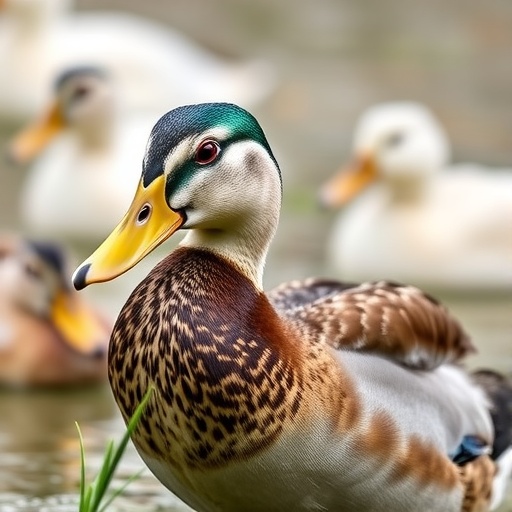Recent advances in the genetic understanding of various animal species have ushered in a new era of precision agriculture, particularly in the domain of poultry production. Among these promising developments, a groundbreaking study conducted by Cai, Han, Zhu, and their colleagues provides compelling insights into the genomic predictions related to growth and feed efficiency traits in a specific duck breeding population. This pioneering research, set to be published in BMC Genomics, is not only significant for the duck farming industry but also for the broader field of agricultural genomics.
The importance of comprehending the genetic basis of growth and feed efficiency traits cannot be overstated. As the global demand for poultry products rises, optimizing growth rates and feed efficacy becomes crucial for sustainable poultry farming. The research team effectively harnessed advanced genomic technologies and analytical frameworks to explore these traits within a well-defined population of ducks. Integration of genetic data with phenotypic measures allowed researchers to mine critical information that could enhance breeding programs.
In this study, the authors employed various genomic prediction models, which play a pivotal role in understanding the heritability of complex traits. By focusing on growth and feed efficiency, they sought to uncover the genetic correlations that exist among different traits and how they manifest in the breeding population. Notably, these models have become intricate yet essential tools for animal breeders aiming to enhance production efficiency without compromising animal welfare or productivity.
One of the standout features of this research is its multi-faceted approach. The study involved a thorough assessment of the genetic variation present within the duck population. By utilizing sophisticated genomic analysis techniques such as genome-wide association studies (GWAS) and genomic selection methods, the authors provided clear insights into particular genetic markers that could be associated with desirable traits. This level of detail not only enhances the understanding of duck genetics but also sets a benchmark for future research in this area.
Moreover, the researchers successfully highlighted the environmental factors influencing growth and feed efficiency. The interplay between genetics and environmental conditions can significantly impact the expression of these traits. Understanding how external factors such as diet, housing, and overall management practices interact with genetic predispositions is paramount for developing effective breeding strategies. The research illuminates the pathways through which genetics and environmental factors converge, ultimately informing farmers about best practices in duck rearing.
The findings from this research have immediate practical applications. By identifying specific genetic markers linked to superior growth and feed efficiency traits, breeders can exploit these markers to select breeding ducks that are likely to exhibit enhanced performance. Furthermore, this approach could lead to reductions in feed costs—a major expense in poultry production—thus providing economic benefits to farmers while also addressing sustainability concerns.
In addition to its practical implications, the research opens avenues for further exploration into genomic selection. The concept of utilizing genomic information to predict the potential success of breeding programs is rapidly transforming traditional breeding practices. As genomic technology continues to advance, the ability to predict the performance and efficiency of breeding stocks will become increasingly precise, facilitating significant enhancements in productivity.
Notably, the publication of this research is well-timed as the poultry industry grapples with the challenges posed by climate change, disease outbreaks, and fluctuating market demands. The need for resilient and efficient animal production systems has never been greater. Genomic predictions such as those developed in this study serve as a foundation upon which future poultry breeding will be built, equipping farmers with the knowledge and tools needed to navigate these challenges.
The collaborative nature of this research also underscores the significance of interdisciplinary efforts in advancing agricultural science. Collaboration among geneticists, statisticians, and poultry breeders provides a comprehensive perspective that enhances the robustness of research findings. Multi-disciplinary teams like the one behind this study are essential for translating complex genomic data into actionable farming strategies.
Finally, the publication of this study in a reputable journal such as BMC Genomics is a testament to the rigor of the research conducted. Peer-reviewed publications play a critical role in ensuring that high-quality research findings reach the wider scientific community and industry practitioners. Contributions like these are instrumental in inspiring generations of researchers, farmers, and industry stakeholders to embrace genomics in agriculture and make informed decisions that align with sustainable practices.
As the poultry industry shifts toward more genomically informed breeding strategies, the work by Cai and colleagues sets a pathway for future studies aimed at optimizing animal production across species. The implications of their findings extend beyond ducks; they lay the groundwork for enhancing livestock breeding practices more generally. As we stand on the brink of a genomic revolution in agriculture, studies like this provide a beacon of hope for advancing food security and sustainable farming worldwide.
In conclusion, as the world continues to evolve and face numerous challenges in food production, research that emphasizes the genetic potential of animals, such as this study on ducks, will remain critical. With a focus on growth and feed efficiency, we may soon witness a new standard of poultry production that is not only efficient but also sustainable and responsive to the dynamic demands of the global market.
Subject of Research: Genomic predictions for growth and feed efficiency traits in a duck breeding population
Article Title: Genomic predictions for growth and feed efficiency traits in a duck breeding population
Article References:
Cai, W., Han, C., Zhu, L. et al. Genomic predictions for growth and feed efficiency traits in a duck breeding population.
BMC Genomics 26, 894 (2025). https://doi.org/10.1186/s12864-025-12087-7
Image Credits: AI Generated
DOI: 10.1186/s12864-025-12087-7
Keywords: genomics, duck breeding, feed efficiency, growth traits, agricultural science, sustainable farming.
Tags: agricultural genomics advancementsduck breeding population studiesduck growth optimizationenhancing breeding programs through genomicsfeed efficiency in ducksgenetic basis of growth traitsgenomic insights in poultry productiongenomic prediction models in breedingheritability of complex traitsintegration of genetic data and phenotypesprecision agriculture in animal breedingsustainable poultry farming practices





